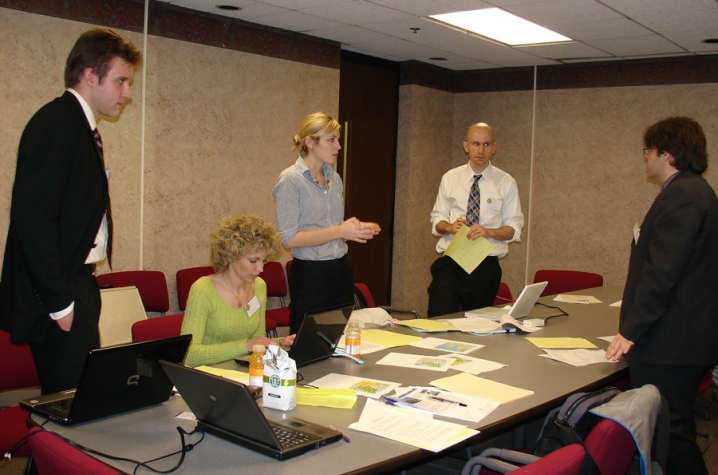24-Hour Global Crisis Seizes Patterson

LEXINGTON, Ky. (Feb. 24, 2010) - The University of Kentucky's Patterson School of Diplomacy and International Commerce is facing a disaster of its own making. The objective: throw first-year graduate students into the cold waters of global crisis management head-on with nothing but intelligence, sound judgment, and instinct to defend themselves.
The Patterson School commences its eighth annual Crisis Simulation at noon Friday, Feb. 26.
"Each year, we launch a 24-hour, real-time policy crisis," said Ambassador Carey Cavanaugh, director of the Patterson School. "The simulation is designed to expose our students to the kind of experiences they would face working with the federal government or corporations handling disasters or conflicts."
While the specifics of the scenario have not been released, the Patterson School will kick off the event with a discussion of international nuclear arms threats by visiting intelligence expert Greg Thielmann. His talk, titled, "Beyond U.S.-Russian Arms Control: How Many Nukes for the Rest of the World," will take place Thursday at 7 p.m. in Room 363 of the UK Student Center.
"We try to bring to campus a speaker that's related in some fashion to the topic," said Cavanaugh. "And we try to have that speaker available to the public." Thielmann's primary research areas include: threat assessments, nuclear/missile proliferation and US-Russian strategic arms control. His discussion Thursday will focus on Iran, China and North Korea.
Thielmann is no stranger to crisis, having served as a Foreign Service officer for 25 years in hot spots ranging from Brasilia and Bonn to Moscow. His final assignment at the State Department was director of the Strategic, Proliferation and Military Affairs Office in the Department of State’s Bureau of Intelligence and Research during the run up to the 2003 Iraq War and Secretary Colin Powell’s famous UN speech.
Thielmann is currently a senior fellow at the Arms Control Association in Washington, D.C. Before that he served as a senior professional staffer of the Senate Select Committee on Intelligence. Thielmann is a member of the Council on Foreign Relations and a former member of the Board of Directors of the Arms Control Association.
UK's School of Journalism and Telecommunications will also replicate a full-scale, 24-hour online newsroom in the simulation for the second year in a row, lending an added realism to the exercise, but also helping journalism students hone their skills for jobs with major news agencies, Web and public relations firms. Students are exposed to real-time pressure and real decisions on ethics and resources, said journalism professor Kakie Urch.
"Patterson School students must react in real-time to another major actor in any international crisis: the 24-7 digital press," she explained. "Our journalism, telecommunications and integrated strategic communications students will simulate reporters from a CNN-like organization, taking and editing video and sound, posting stories and updates to the Web, attending 'press conferences at the State Department' and so forth."
Recent crisis simulations have dealt with topics ranging from Somali pirates to how the Organization of American States might respond to a regime change in Cuba, all topics strikingly fitting for the international landscape.
Patterson School professor Richard Farley developed the last four scenarios and will direct and manage this year's simulation as well. "We tend to check with our contacts in Washington about the kinds of problems they are expecting and what they are worried about," explained Cavanaugh. "From our discussions with the Pentagon, the State Department and academic think tanks, we come up with a scenario that might happen."
The Patterson School is joined by Georgetown University, Stanford and Harvard’s Kennedy School in offering such diplomatic emergency training. "Simulations are extremely common inside the government," said Cavanaugh. "And we pattern our involvement to the exercises done there."
For more information, please contact Christine Wolcott at cawolc2@email.uky.edu or 859-257-4666.




